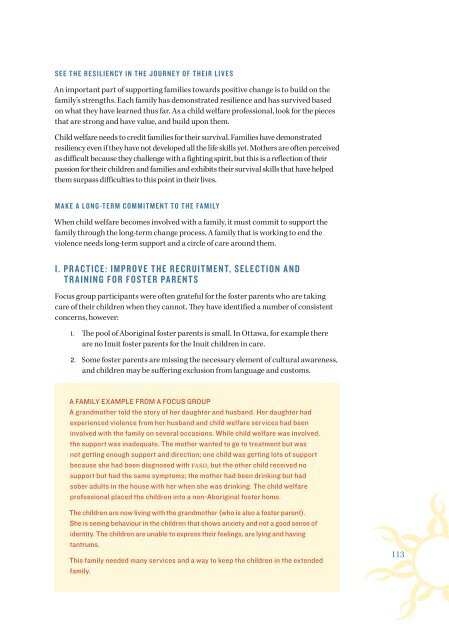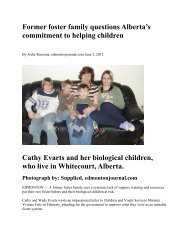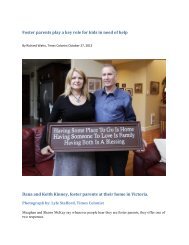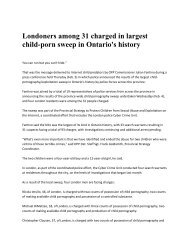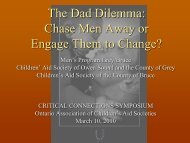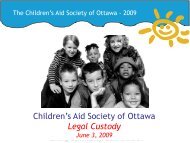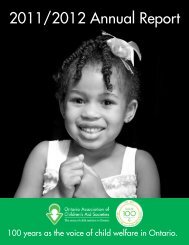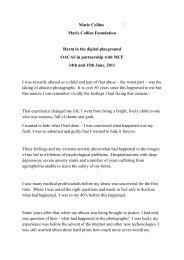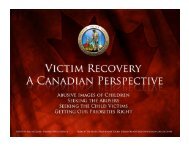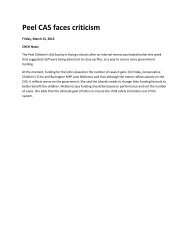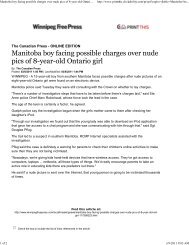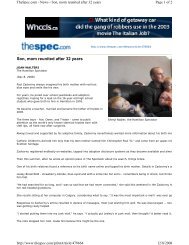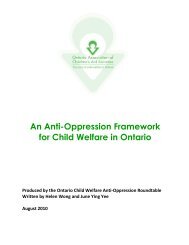English - Ontario Association of Children's Aid Societies
English - Ontario Association of Children's Aid Societies
English - Ontario Association of Children's Aid Societies
You also want an ePaper? Increase the reach of your titles
YUMPU automatically turns print PDFs into web optimized ePapers that Google loves.
SEE THE RESILIENCY IN THE JOURNEY OF THEIR LIVES<br />
An important part <strong>of</strong> supporting families towards positive change is to build on the<br />
family’s strengths. Each family has demonstrated resilience and has survived based<br />
on what they have learned thus far. As a child welfare pr<strong>of</strong>essional, look for the pieces<br />
that are strong and have value, and build upon them.<br />
Child welfare needs to credit families for their survival. Families have demonstrated<br />
resiliency even if they have not developed all the life skills yet. Mothers are <strong>of</strong>ten perceived<br />
as difficult because they challenge with a fighting spirit, but this is a reflection <strong>of</strong> their<br />
passion for their children and families and exhibits their survival skills that have helped<br />
them surpass difficulties to this point in their lives.<br />
MAKE A LONG-TERM COMMITMENT TO THE FAMILY<br />
When child welfare becomes involved with a family, it must commit to support the<br />
family through the long-term change process. A family that is working to end the<br />
violence needs long-term support and a circle <strong>of</strong> care around them.<br />
I. PRACTICE: IMPROVE THE RECRUITMENT, SELECTION AND<br />
TRAINING FOR FOSTER PARENTS<br />
Focus group participants were <strong>of</strong>ten grateful for the foster parents who are taking<br />
care <strong>of</strong> their children when they cannot. They have identified a number <strong>of</strong> consistent<br />
concerns, however:<br />
1. The pool <strong>of</strong> Aboriginal foster parents is small. In Ottawa, for example there<br />
are no Inuit foster parents for the Inuit children in care.<br />
2. Some foster parents are missing the necessary element <strong>of</strong> cultural awareness,<br />
and children may be suffering exclusion from language and customs.<br />
A FAMILY EXAMPLE FROM A FOCUS GROUP<br />
A grandmother told the story <strong>of</strong> her daughter and husband. Her daughter had<br />
experienced violence from her husband and child welfare services had been<br />
involved with the family on several occasions. While child welfare was involved,<br />
the support was inadequate. The mother wanted to go to treatment but was<br />
not getting enough support and direction; one child was getting lots <strong>of</strong> support<br />
because she had been diagnosed with FASD, but the other child received no<br />
support but had the same symptoms; the mother had been drinking but had<br />
sober adults in the house with her when she was drinking. The child welfare<br />
pr<strong>of</strong>essional placed the children into a non-Aboriginal foster home.<br />
The children are now living with the grandmother (who is also a foster parent).<br />
She is seeing behaviour in the children that shows anxiety and not a good sense <strong>of</strong><br />
identity. The children are unable to express their feelings, are lying and having<br />
tantrums.<br />
This family needed many services and a way to keep the children in the extended<br />
family.<br />
113


